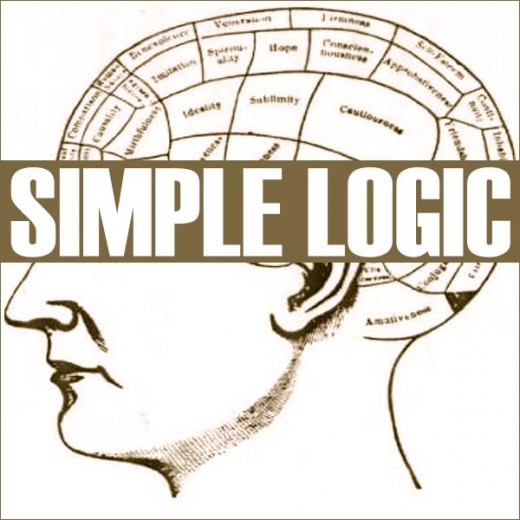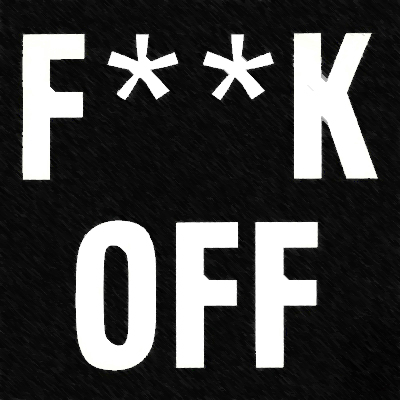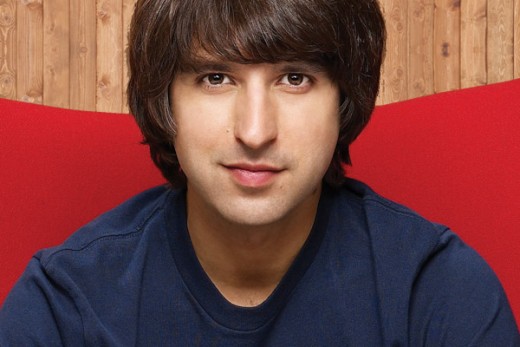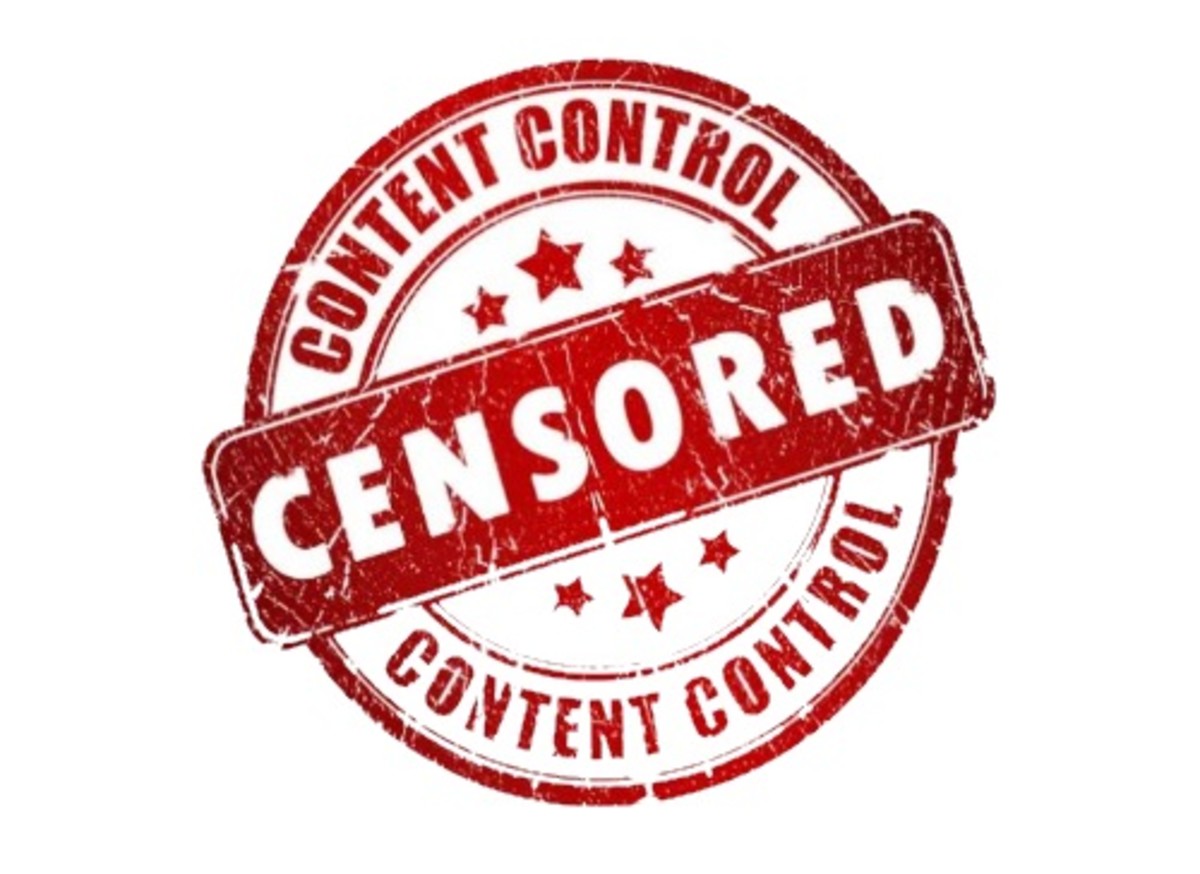Arbitrary Censorship

"We have more ways to describe dirty words than we actually have dirty words. That seems a little strange to me. It seems to indicate that somebody was awfully interested in these words. They kept referring to them: They called them bad words, dirty, filthy, foul, vile, vulgar, coarse, in poor taste, unseemly, street talk, gutter talk, locker room language, barracks talk, bawdy, naughty, saucy, raunchy, rude, crude, lewd, lascivious, indecent, profane, obscene, blue, off-color, risqué, suggestive, cursing, cussing, swearing... and all I could think of was: shit, piss, fuck, cunt, cocksucker, motherfucker, and tits!"
- George Carlin, from his 1978 HBO Special, Again!
There are those who would sacrifice the rights of others for their own interests. The audacity of this is so great that one might applaud it were it not so damnable a sin—and I do call it a sin. That's of course subject to change; if, for example, I were asked to pick one transgression, and one only, to be called a sin, I wouldn't call censorship a sin. I would call it the sin. It must be understood, censorship is inherently thought-criminalization; it is telling you that whatever goes through your mind, whatever in you is human, is wrong. In this regard, a censor is not unlike a murderer. One is a bringer of death; the other is a taker of life.

In his 1883 novel Thus Spoke Zarathustra, Friedrich Nietzsche posed the question, “What is ape to man?”, and answered, “A laughingstock or a painful embarrassment.” What separates man from the rest of the animal kingdom? In his 1844 manuscript Estranged Labour, Karl Marx draws a distinction between human and animal functions, ascribing eating, drinking, and procreating to the latter; “Certainly,” he continues, “eating, drinking, procreating, etc., are also genuinely human functions. But taken abstractly, separated from the sphere of all other human activity and turned into sole and ultimate ends, they are animal functions.” When you remove the animal functions from this sphere of human activity, what remains? Reworded: What characteristics do humans possess that are unique to all other animals?

The primary answer: Cognition. Human consciousness has yet to be definitively understood by scientists, though it must surely have a biological origin. Thinking, of course, is as important to the survival of humans as any of the processes mentioned above: Problem-solving is what kept our physically unimpressive species (do you have any idea how strong the other primates are?) alive, and thanks to it humans dominate the earth. However, thoughts, unlike eating, drinking, procreating, etc., are not key to the continuation of the species, plenty of species survive without complex minds. Therefore, thoughts are allowed to be fanciful; they are inherently secondary. Introspection, curiosity, philosophy: These are all great things; these are all superfluous things. The virtue of humans, then, is that we will think beyond the borders of necessity, and because of that, we can create. Art, literature, film, poetry, science; indeed, thought is where we glean meaning in our lives.
Stifling one's thoughts and one's self is denying one's humanity, and denying one's humanity leaves only an animal; it is degrading. It may be okay for people to suppress traits they find undesirable, if they think themselves better for it; discipline is not a bad thing. However, as the saying more or less goes, “my right to throw punches ends at your nose.” I am my own moral arbiter. If I am dissatisfied with my behaviour, or if I perform below my own ideal, it is therefore my right, arguably my duty, to change myself for the better. I am my own moral arbiter; nobody else may claim that position, and nobody else may claim that authority over me. Just as I cannot claim that authority over other people. Applying your standards to yourself makes sense. Applying your standards to others does not make sense. In order to deserve any say in what I do, you have to convince me that your ideal is superior to my own. If your morals have any merit whatsoever, this should not be an exacting task; if you cannot provide for me any compelling reason to accept your position, then your position is unreasonable and neither of us should be compelled to accept it.

To be a censor in any measure inherently means that you have taken it upon yourself to dictate the behaviour of others to be more ideal, but the only possible frame of reference for what this “ideal” actually is comes from you; you, your values, your vices, your biases, your inclinations. Let's take a real life example: Say a conversation of mine is overheard by a stalwart moral crusader, whose vigilant ears catch the word “fuck” escape my mouth. The shock of the word, not unlike the crack of a gunshot, startles him, so much indeed that he drops what he's carrying (a box of eaves, incidentally, but not to worry; he's no stranger to eavesdropping). In his indignation and with syringe prepared, he rushes to confront me, tap on my veins, swab my arm with alcohol, and inject me with a full dose of justice. His chest swells with anticipation; our eyes lock, and I can see an ocean of passion in his irises. Inhale; and the levee breaks: “That's a bad word!”
Says who? I really want to know. It's not a bad word, it's just a verbal faux pas. A taboo. Well, what dictates our cultural taboos? Our culture, obviously. However, "culture" has less right to dictate a person than another person does. Culture is far too general. A culture does not define an individual. Even in a like-minded culture, no two people are exactly the same; in fact, some people are radically different. Sensibilities change from person to person—and from culture to culture. We can't censor something for being “offensive” when different people take offense to different things. Growing up in Utah, for example, is far different from growing up in, say, Ireland. In Ireland, anything goes. In Utah, even TV-okay cuss words are frowned upon. Damn, hell, ass—we're not having it here, and that's to say nothing of the unmentionables, things that aren't even allowed on TV. So, the cultures are different from one another, the people are different from one another, the sensibilities are different, the words are different: Tell me then, by what standard is any combination of syllables not okay? It's beginning to sound rather presumptuous to try and censor any word at all. After all, how can a word be objectively morally bad when its use and repute vary simply from place to place? If a person grows up hearing that a certain word is naughty, and that he ought not say it, he won't; not for any moral reason, nor for any reason at all, but because he was raised that way, in a culture where that word is considered bad. There's a clear difference between moral and cultural objections. A cultural objection is just something you're raised with, something that you naturally just come to reject. What is it called again when you're taught something from a young age and brought up not to question it? It's right on the tip of my tongue...

More interestingly, however, is not our avoidance of words, but our adoptions of words to express the same ideas. George Carlin made the following observation in his HBO Special Again!: “...You can't say 'fuck' on television. However, you can refer to fucking. You can talk about fucking...they talk about fucking all the time, they just don't call it that. They call it other things.” Think about it: It's wrong to prohibit a word, because prohibiting a word prohibits that idea. Prohibiting an idea is prohibiting a thought. Prohibiting a thought is denying humanity. Prohibiting a word, but not the idea, though, that's not just wrong, it's pointless. “Shit,” for example. “Shit” is prohibited. “Shit” is bad. “Shit” you cannot say. “Shoot,” on the other hand, that's perfectly okay. So is “crap.” There's an entire roster of pseudo-dirty words we've created simply to avoid using the actual dirty words: Darn it, dang it, damage, snap, ship, shiz, shoot, crap, crud, heck, fudge, frick, frack, freak, eff, flip, fetch, gosh, golly, goodness, geez, pete's sake, H-E-double-hockey-sticks, nuts, son of a gun, son of a biscuit, just son of a, pansy, mofo, bastage, bandage—to name a few. We haven't eschewed cursewords, we've just dressed them up a little bit. But, as Shakespeare wrote, and as I'm sure you've heard, “A rose by any other name would smell just as sweet.” Words are not universal; ideas are. Un-deux-trois is no different than one-two-three. What, for all intents and purposes, is the difference between “shit” and “crap,” really? This tastes like ____. I feel like ____. You don't know ____. Either word would fit nicely in each of those sentences without skipping a beat; they both relate the same idea, they both convey the same message, the both mean the same thing. So why is one any more profane than the other? It's the difference between mailing someone a package in a basket as opposed to a box. I'd also like to mention how stupid it is to use asterisks, like “f**k,” or any such blackout, because then it's not even censoring the word. You can clearly understand what word it is; you're just covering it up a bit on paper.

And that's to say little of the futility of prohibiting an idea anyway. Dwight D. Eisenhower once said, in a speech at Dartmouth College, “Don't join the book burners. Don't think you are going to conceal thoughts by concealing evidence that they ever existed.” To put it more concisely, as Alan Moore did in his graphic novel V For Vendetta, “Ideas are bulletproof.” You can't stomp out a thought. You can challenge it, which seems most noble; you can ignore it if you are truly offended by it; but you can't eliminate it. Trying to kill an idea is like trying to kill a mouse; if you catch one, rest assured there are more of them in the walls. And for what reason would you want to ban an idea anyway? Only if it were completely averse to your own, and, more to the point, you have no means of contesting it. After all, if you could capably argue against it, you could dismiss it. It's when you can't capably argue against it and refuse to change your own ideas that you simply want it gone. I heard the following quote, once, from a stranger: “If you ask for advice with closed ears you will only hear your own opinion.” The same principle applies here. You can't grow or develop cognitively without exposure to new thoughts and perspectives. A child who figures that 2+2=5 will stand uncorrected if neither he nor his peers take the time to challenge his reasoning. The notion is undisputed, but I think you'll find that's worth a lot less when it has never been disputed. To quote Socrates, “The unexamined life is not worth living."

It's impossible to squash an idea; but it's certainly not for lack of trying. Nazi Germany had an entire ministry dedicated to the censor, headed by Joseph Goebbels. When the state censors, it is not because the state is offended; it is because the state has an agenda it wishes to enforce. The state doesn't censor offensive material, it censors threatening materials. Needless to say, the people of Nazi Germany lived in a permanent filter; they saw only what the Nazis wished for them to see, heard only what the Nazis wished for them to hear, and said only what the Nazis wished for them to say. The Nazis were not unique in this regard, and certainly not the most recent: The Czech Republic was Stalinist until as recent as 1989. North Korea still is. Christopher Hitchens, who has been to both of these places at their worst, described his visit to North Korea as such:
“I went to North Korea. Finally got in. Took me a long time; had to go under second identity, had to pay a huge bribe, I was there. I got there. And I thought, 'I know what I'm not going to say about North Korea; I'm not going to say it.' The schoolchildren march to school carrying pictures of the Dear Leader and the Great Leader; the loudspeakers speak of nothing but the Great Leader and the Dear Leader; at workplaces there are sessions set apart every day for cries of hatred against the United States and the West and South Korea; 'I'm still not going to do it. They won't make me say 1984, they just won't make me do it.' But eventually they make you do it.”
1984—now that's quite a parallel to draw. But, as Hitchens puts it later in his description, “there's no other standard of comparison.” You wouldn't call North Korea more subtle than Nazi Germany; loudspeakers blaring propaganda day in and day out could hardly be deemed indirect. That they succeeded where the Nazis failed is due to several contributing factors: Their isolated geography, that they're not actively trying to take over the world, and most importantly the time those two things have earned them. North Korea has been censoring and influencing the thoughts of the North Korean people for decades—if you could call them people anymore, considering how stripped of humanity they are. Nietzsche wrote in his 1881 work The Dawn, “The surest way to corrupt a youth is to instruct him to hold in higher esteem those who think alike than those who think differently,” and this is certainly what has been achieved in North Korea. North Korea, where individuality and reason have been almost demonized, the people reduced to sheep and expected to only follow their shepherd, the Dear Leader, not allowed to speak their minds, detained for speaking out against the regime, and prohibited from speaking to people outside of the country. According to World News, a man in North Korea was executed by firing squad for the heinous crime of calling someone in South Korea. Executed. They killed him for escaping their borders via cell phone; for having contact with the outside world. Know this: That is what the goal of censorship is, to whatever scale. To create a bubble of sorts, and arbitrarily filter what's being received, and to attempt to wish away whatever is outside; the censor is a coward's tool. I'd be lying to decline that wry satisfaction, the self-indulging amusement I get when I'm told not to swear; as Walter Bagehot said, “The greatest pleasure in life is doing what people say you cannot do.” But I'd also be a fool not to disparage the censorship of North Korea, or the chutzpah that must be in a man who would attempt to eliminate your ideas in favour of his own. So there you have it. Censorship comes in two flavours: Laughable and condemnable.







